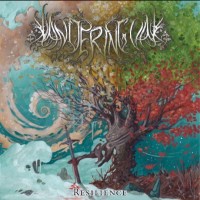Wandering Oak - Resilience review
| Band: | Wandering Oak |
| Album: | Resilience |
| Style: | Melodic black metal, Folk metal, Progressive metal |
| Release date: | February 02, 2024 |
| A review by: | musclassia |
01. To Lir They Fell
02. A Florid Grain
03. Resilience
04. Vespertine
05. Snowbound
Black. Folk. Prog. Wandering Oak combine all of these metal genres on Resilience; all they needed to do was throw in some melodeath and it would be the perfect Metal Storm album.
The Rochester, New York ensemble founded and led by vocalist/multi-instrumentalist Robert Pollard have been around for over a decade, but have been moving steadily, only now releasing full-length album number two, Resilience. There’s been line-up changes in the half-decade since Passage Elemental, as Pollard is handling all guitar duties here (save for some guest solos from Andrew McGirr), and Monica Finger has been replaced by CW Dunbar on drums. This new-look line-up has synthesized an array of different influences into an enchanting listen nicely captured by the luscious album artwork.
The first point worth mentioning is that topic of solos; I don’t know which ones can be credited to Pollard as opposed to McGirr, but either/both of them have brought their A-game here. Resilience is littered with solos (some of which actually turn into guitar duets in standout moments), and most of them light up the sections in which they feature, with a particularly exciting melodic solo appearing around 5 minutes into closing epic “Snowbound”. Probably the only solo that doesn’t quite do it for me is the one near the end of “Vespertine”, which turns a bit wonky and chromatic in a way that doesn’t match the vibe of the surrounding song, but aside from that, top marks for the solos here.
As for the rest of Resilience, of those three styles namedropped at the beginning of the review, the folk side of Wandering Oak has most of its presence within the first two songs. 11-minute opener “To Lir They Fell” opens in a blackened folk style, with an almost early Primordial touch to some of the riffs, and the subsequent track flickers between this more aggressive blackened sound and lighter folk melodies. In particular, an acoustic lull a couple of minutes in even features a pipes cameo to ram home the folksiness.
To match the contrasting tones of the intense and melodic, Pollard uses both extreme and clean-sung vocal styles. The former encompasses both shrieks and growls, and the lower roars in a complex proggy part near the end of “To Lir They Fell” briefly took my mind towards Ne Obliviscaris. The clean singing, which moves in a lower register, has something of an epic heavy touch to it; his delivery isn’t fully refined, but comes with a lot of power, and as a result I find it fits with metallic song sections a bit more naturally than softer clean segments, such as the acoustic opening of “A Florid Grain”.
After this folksy opening duo, the tone of Resilience shifts a tad. Probably the most unique song on the album is the title track, which lies in the middle of the tracklist. It opens in a sound reminiscent of thrash or US power metal, before moving towards a blackened thrash tone; the song feels a bit proggier than the opening duo, and as a consequence of this, it does occasionally suffer from probably the most consistent ‘gripe’ I have with the album, in that the flow between sections is perhaps inconsistent during the more chop-changing portions of the record. However, in its more triumphant moments, “Resilience” offers a surprisingly effective spin on something not a million miles away from Trivium, as thrashy riffing is accentuated by NWOAHM guitar leads.
Of all the namedropping to do in this review, however, the most obvious reference that has to be made is to Opeth, specifically for the final pair of songs. Just listen to the opening of “Vespertine”, featuring jazzy fretless bass, darkening acoustic guitars and faint cleans, and tell me you don’t get Still Life flashbacks. The slightly gnarlier tone of the blackened prog riffing on the track sustains this vibe, which is carried over into the acoustic opening of “Snowbound”. The 14-minute closer does also have some minor issues with overly stop-start writing, but when the best moments arrive, whether it be one of the several flashy solos contained within, or a really nice technical melodic riff that instigates the song's finale after a brief fadeout around the 10-minute mark, Wandering Oak hit the spot nicely.
Qualms over the fluidity of the songwriting aside, Resilience is an enjoyable record that brings together many of the strengths of the constituent genres and noteworthy musical influences. That vibrant artwork brings to mind some of the album covers used by Metal Storm darlings Wilderun, and while Wandering Oak’s style fusion isn’t quite as accomplished as those guys, they’re onto something that should satisfy a number of the denizens of this site.
Rating breakdown
| Performance: | 8 |
| Songwriting: | 7 |
| Originality: | 6 |
| Production: | 7 |
Comments
Hits total: 1476 | This month: 21





